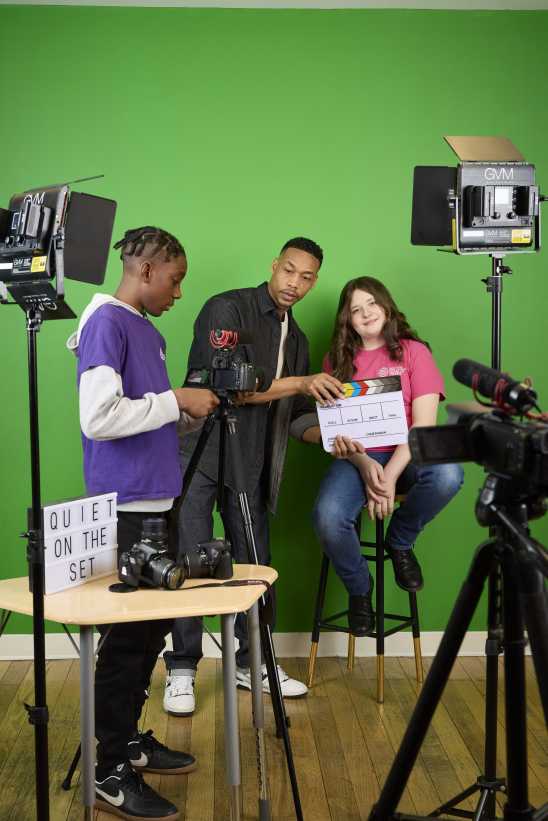Your child walks into the crowded cafeteria and scans the room looking for an open table. Suddenly, all eyes are on him. The huge room goes quiet. His peers have stopped mid-sentence, mid-bite to stare at the new kid.
Your child’s face is flushed, and his cheeks are turning bright red. It appears he may have forgotten how to breathe. No, this is not a nightmare. It’s your child’s first day at a new school.
According to the US Census Bureau, more than 2,000,000 families with children between the ages of 6 and 17 move around the United States every year. With those statistics, chances are your child is not the only new kid at school.
But being the new kid doesn’t have to be quite so scary and anxiety inducing. With a few simple steps, you can help your child be the new kid they want to be:
Get the lay of the land
Before your child’s first day, visit the new school (preferably when class is out or when the school is relatively empty) or get a tour. Find out where her class or classes are, her locker, the library, the gym, the cafeteria, the restrooms, etc. Becoming familiar with the layout and knowing what to expect can ease overall anxiety — including those first-day jitters.
Bring a camera and take pictures (visual aids are always helpful) and get a map of the school. The more familiar your child is with the school, the better.
Take some time walking around the grounds and playing on the playground.
Walk your child through her schedule and help her envision a typical day at her new school. Courtney Carlisle Bolton, PhD, says, “The more your child can anticipate, the less anxious she may be on the first day. Help alleviate any fears she may have by preparing her in advance of what the daily schedule and routine will be at school.”
Meet the players
Meet the principal, the office staff, the classroom teachers, and as many members of the faculty as possible who will be interacting with your child.
See if the principal can suggest a student to be your child’s “buddy” for the first day or two of school. This buddy can show your child the ropes and introduce her to other students. Dr. John Duffy, clinical psychologist and author of “The Available Parent: Radical Optimism for Raising Teens and Tweens,” says, “This helps your child become acclimated to the building, the culture and, to an extent, the social climate of the school.”
Contact the Parent-Teacher Association president and ask if he or she has any information about the school or students that could make your child’s transition into the new school easier. Also ask if he can direct you to your child’s classroom roster. Contact the other parents to arrange a play date at a nearby park. This is a great way to introduce your child to her future classmates. Having a friend on the first day of school can give your child the confidence she needs.
Get involved
What interests does your child have? Find out if the school offers programs your child might find exciting (theater, music, sports, etc.).
As a parent, join the Parent-Teacher Association, volunteer in the classroom, and get involved any way you can.
“Meeting other parents, kids, and staff is the best way to help your child and your family transition and thrive in a new school,” says Amy Hilbrich Davis, CEO of the professional development company for parents, Inspiring Moms and Dads.
Making friends
The key to making friends is to find a common interest. Help your child be open to finding that common ground.
Talk to your child about a time when you were making new friends. Think back to what worked for you. Share any experiences that you think will be helpful for your child.
Each child is going to have a different approach. Some are going to be fine walking right up to a peer or a group of kids and introducing themselves. For others, this may be completely out of character.
Jill Kristal, president at Transitional Learning Curves, says her 10-year-old son commented that in order to be accepted by the other kids, he had to wait it out, sit on the sidelines, and give people a chance to get used to him. He figured out a good way to navigate the social minefield of being the newbie.
Help your child. Offer advice, but have respect for her process.
Talk about feelings
Be patient. As with any transition, there is a period of adjustment.
Jenny Rogers, a kindergarten teacher and mother of two, says, “After you and your child have taken that school tour, talk about things that surprised them or ways that this school is like their old school. This often starts a good dialogue about worries, concerns, and helps the child picture him or herself in this new school. As all great parents do, spin the ‘worries’ into positives!”
Listen to your child. Validate her concerns. Offer up your own experiences and empathize.
In some way or another, we’ve all been there.
Sell it
“Your attitude as a parent is powerful! Be positive! Acknowledge that new can mean scary and create anxiety, yet it also means exciting, more friends, and an improved life. If you, as the mom or dad, believe this, then so will your kids. Live the life you want your kids to live and jump in!” says Davis.
And finally, remind your child that she is the cool, mysterious, new kid and to have fun on this exciting adventure. Trust your child to be successful.
Cassi Denari is a freelance writer and a professional “new kid.” From kindergarten to senior year she went to 13 schools. By the time she hit high school, she had the “new kid” process down to a science. She is the mother of two boys, and in her spare time, she writes children’s stories.





















